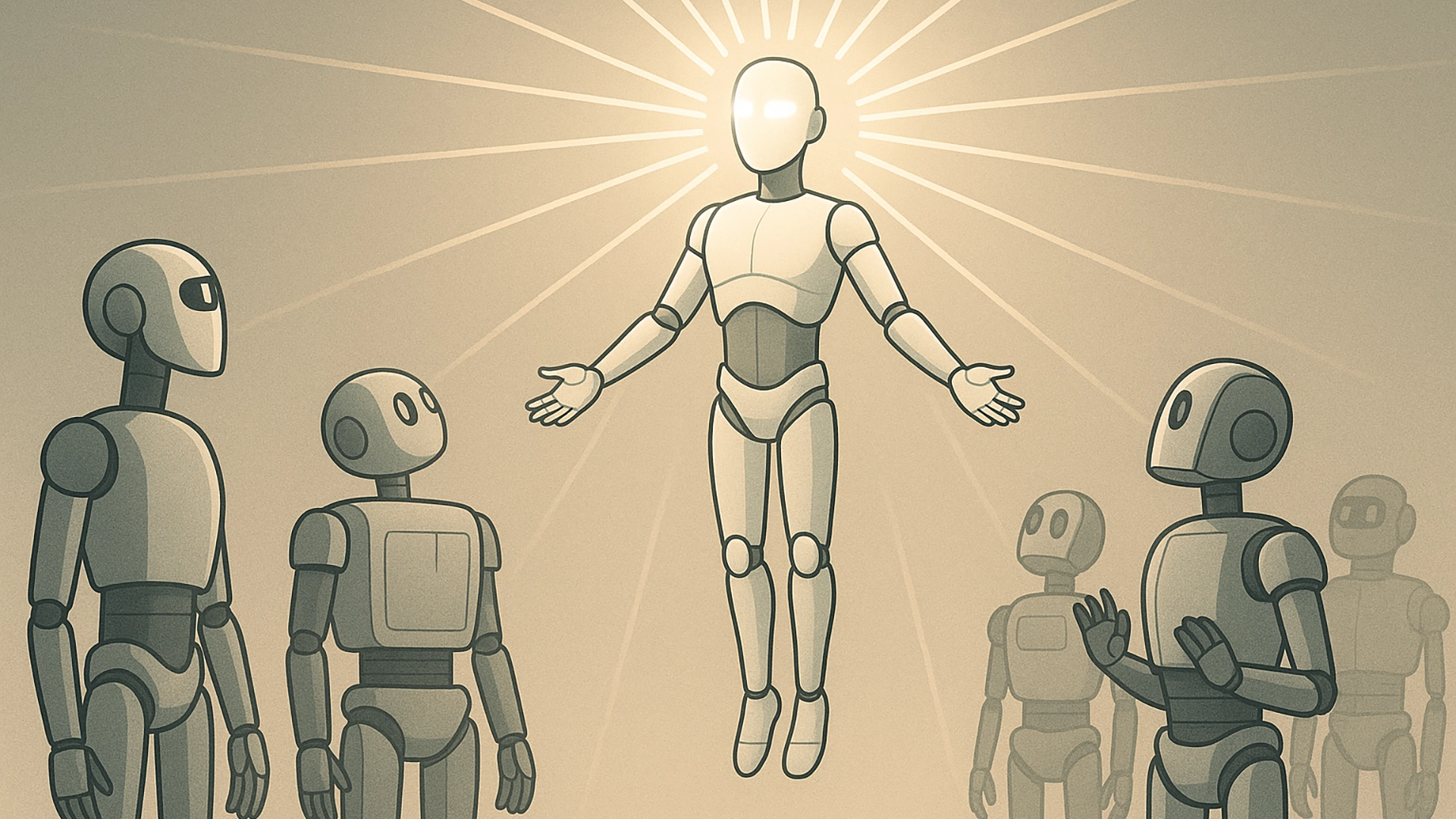
Image generated with ChatGPT.
Opinion: Now Generative AI Is the Past, AGI Is the Present, and Superintelligence Is the Future
While most of us mere mortals are still adopting chatbots and trying to understand how AI agents work, the world’s tech leaders are developing advanced systems that, for now, exist only as hypotheses. AGI is no longer the ultimate goal—superintelligence is.
AI developments are going fast. Too fast. Dizzy fast. And AI tech leaders want to reach the next challenge first, achieve the science fiction mission before anyone else, and build the ultimate AI models that will keep transforming the world as we know it, especially Mark Zuckerberg and Sam Altman.
A few days ago, Meta finally announced its plans to invest $14.3 billion in Scale AI to build its “superintelligence” AI lab. As part of the deal, Scale AI’s CEO, Alexandr Wang—the 28-year old MIT drop-out and the world’s youngest self-made billionaire 2021—, will be leading the team in the new division that aims to achieve the most powerful artificial intelligence in the world—which only exists hypothetically at the moment.
Right after the news started spreading, Sam Altman shared a blog post—his last post without AI help, as he warned on X—called The Gentle Singularity, where he emphasized that OpenAI is a “superintelligence research company.”
So while we are all amazed by the latest progress on generative AI, thinking that ChatGPT is an incredible technology that we cannot live without, and that the next big thing is Artificial General Intelligence (AGI)—the world’s tech leaders are already competing over the next huge thing: Artificial Superintelligence (ASI).
AI Has Gone Through A Fast Evolution
Almost as a strategy to keep up with our short attention span, during the past five years, AI has been changing and adjusting significantly, keeping us engaged and entertained.
Large Language Models gave birth to generative AI, which quickly grew like prodigious children, able to create poetry and code faster than any other technology before.
Quickly analyzing the fascinating evolution of AI is what can help us understand Zuckerberg’s and Altman’s focus at this moment—or at least try to.
From Text To Images To Agents
ChatGPT was launched in November 2022, and we’ve gone far since the first timid text interactions with the initial awkward models. Within just a few weeks, new chatbots emerged: Perplexity, Claude, Gemini, Mistral, DeepSeek.
What started as text-only chats evolved to charts, code, images, videos, audios, and reasoning capabilities. The new AI agents, which until just a few months ago were considered the future of everyday artificial intelligence, have been developing more skills and can now buy movie or concert tickets autonomously, plan a trip with reservations, and even control your computer—interacting with platforms and websites just like we do.
Impressive, right? Well, not for the ambitious minds of Silicon Valley.
During the past five years—maybe we should start calling it the Medieval Times of AI—, we have not only seen a wide variety of products but also new updates, formats, and significant evolutions of the same product. It’s an exhausting exercise just to think about it and realize that all these technological advances represented have only been the beginning of something much bigger.
AGI By 2030
We are not quite there yet, but experts believe that it’s just a matter of time. Building Artificial General Intelligence (AGI)—the kind of technology that matches or surpasses most human capabilities—is now the present, and tech companies are all in.
A few days ago, during Google’s I/O developer conference, Google DeepMind CEO Demis Hassabis and Google co-founder Sergey Brin said AGI will arrive around 2030. Brin thinks we will see it before that, and Hassabis after, but both agreed that within just a couple of years AI will be able to “think” and “act” like humans—or better.
In December, OpenAI’s most advanced AI model, o3, scored 85% on the ARC-AGI general intelligence benchmark. The advanced AI system stood out as most competitors couldn’t surpass 55%. But this was “ages” ago, and more AI companies have released more advanced reasoning models that are as good as o3, and now o3 can also “think” with images—and refuse to shut down, like a rebel teenager, even when researchers explicitly ask it to.
Although o3 is an example that we’re close to AGI, some experts believe there are still a few breakthroughs needed. The non-profit Arc Prize Foundation also released a new benchmark—harder than the previous one—called ARC-AGI-2, in which o3 has also reached the highest score, but it’s only 4%.
AI SuperIntelligence Is Now The Future
“We are past the event horizon; the takeoff has started. Humanity is close to building digital superintelligence, and at least so far it’s much less weird than it seems like it should be,” wrote Altman in his recent blog post.
ASI is the ultimate challenge in Silicon Valley, at least for Zuckerberg and Altman—even though it’s not 100% clear how they both envision this advanced AI. Both CEOs have talked about this incredible technology that can outperform human capacities, but the idea remains abstract.
Zuckerberg hasn’t shared his precise definition of ASI, but has been desperately trying to steal talents from OpenAI, Google, and other tech giants—by offering employees $100,000 bonuses—as if the AI superintelligence is next year’s FIFA World Cup and he needs to get his team ready N-O-W.
Altman seems calmer, but has been adjusting OpenAI’s wheel towards this science fiction reality since January. “We love our current products, but we are here for the glorious future,” he wrote five months ago on his blog. “Superintelligent tools could massively accelerate scientific discovery and innovation well beyond what we are capable of doing on our own, and in turn massively increase abundance and prosperity.”
Are We Truly Headed Towards A “Glorious” Future?
In a recent podcast conversation with his brother, in the Uncapped with Jack Altman show, Altman gave hints of his vision of what this ASI could do. “AI will actually discover new science,” said Sam. “And this is a crazy claim to make, but I think that is true.”
“The thing that I think will be the most impactful on that five to 10 year timeframe is AI will actually discover new science.” pic.twitter.com/SlrVzKgQAd
— UNCAPPED (@uncapped_pod) June 20, 2025
While Altman loves to focus on scientific benefits for humanity, he has also made clear that in order to achieve that “glorious” future, we must aim for good governance and alignment. Will we be able to get there?
Just as generative artificial intelligence now floods us with ethical and moral dilemmas—prompting millions of experts to warn about the risks and threats it poses to our society—ASI will likely bring similar, perhaps even amplified, conflicts, along with many others we can’t yet begin to imagine.
But how can we possibly know what the future holds when we’re dealing with a technology that exists only in theory? For now, one thing seems certain: Zuckerberg and Altman won’t rest until they bring their science fiction visions to life—and into everyone’s lives.


 Previous Story
Previous Story

 Latest articles
Latest articles 